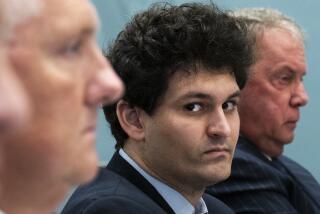The Ways and Means Chief of Kostkaville : Politics: It’s all the little things that ‘Danny’ Rostenkowski does for the 5th District that make his neighborhood so loyal.
- Share via
CHICAGO — On the sun-swept streets of Kostkaville, on sandlot ball fields and in the pews of cavernous limestone churches, there is no confusing the plight of the neighborhood congressman with the fate of the nation.
Named after a Polish saint, this grid of row houses is the heart of Rep. Dan Rostenkowski’s home base, a place where the embattled House Ways and Means chairman matters more for the little things he does than for his legendary Washington clout.
It is the little things--toasters and appliances for the sisters of St. Stanislaus Kostka, park fees for fast-pitch softball teams, a lucrative fund-raiser for the Polish Museum of America--that many of Rostenkowski’s constituents fear they will miss most if he is convicted after 17 federal criminal charges were leveled against him Tuesday.
“This is a guy who’s always giving back to the community,” said Kelly Torres, a city supervisor at Pulaski Park, a square-block field across the street from Rostenkowski’s home. “He helps people around here in a thousand different ways. Nobody wants to see him go.”
His prominence atop the committee overseeing the nation’s tax laws had helped Rostenkowski become Congress’ leading earner of honorariums, the fees that legislators earn for making personal appearances before lobbyists and special interest groups. Last year, Rostenkowski made $80,500 in honorariums. Under federal law, the fees must go to charity, providing Rostenkowski with ample amounts to donate to pet causes ranging from orphanages to hot dog lunches for neighborhood children.
Those who rely on his speaking engagements and on excess funds from his campaign coffers are, predictably, among his most ardent loyalists. They talk protectively of his generous nature--a side of Rostenkowski they insist the outside world rarely sees. And they worry that any successor might sorely lack his human touch.
“People realize that if we lose him, we lose something special,” said the Rev. Joseph Glab, priest at St. Stanislaus Kostka, Rostenkowski’s home church. “He has a real connection with people in this neighborhood. A city is only as important as its neighborhoods, and he’s part of ours.”
It was Rostenkowski who quietly wrote a check to the church’s nuns after he learned in a conversation with Glab that the appliances in their convent had fallen into disrepair. And it was Rostenkowski who made the largest donation six years ago to a $140,000 renovation campaign to repair the church’s bell tower, electric system and scarred interior.
Rostenkowski has chipped in for trophies and park fees for neighborhood Little League teams and bought uniforms for the Deadmen, an amateur football club. A contribution from his campaign funds paid for a Polish Constitution Day performance by the Li’l Richard Polka Band--who thanked him by playing “The Danny Rostenkowski Polka.”
When the sons and daughters of Kostkaville’s Polish American and Mexican immigrant families crowded Pulaski Park for a cleanup campaign, “Danny even paid for the hots dogs and chips,” Torres said. “He just did it out of the goodness of his heart.”
There are times when goodness has little to do with altruism and much to do with the unspoken quid pro quo of politics.
Joanna Janowski, the curator of the Polish Museum of America, is grateful for Rostenkowski’s occasional contributions. But she appreciates even more the donations that have come in his honor.
When Rostenkowski was awarded the Polish Spirit Award at the museum’s annual Summer Ball in June, 1992, his presence brought the museum $85,000 in donations--more than four times what it normally brings in for the event, Janowski said. Among the contributors were lobbying and commercial giants, such as the Philip Morris Co. ($5,000), the Sara Lee Corp. ($5,000) and the National Food Processors Assn. ($2,000).
Even as Rostenkowski was described by a federal indictment as a politician who lined his pockets with money siphoned from the paychecks of ghost employees, many of his beneficiaries in the 5th Congressional District said it is his reluctance to ask for favors that made him a beloved figure.
“He’s not flamboyant about helping,” Glab said. “He just asks if you need anything, and if you mention it, he does what he can. He gives again and again, and never with any ulterior motive.”
But others in his district concede that Rostenkowski calls in old favors from those he has helped with his charity. In the furious final days of March’s Democratic primary, Rostenkowski’s aides boasted that his extensive network of prominent friends helped dispel the stigma of corruption that hampered his reelection bid against two Democratic Party challengers.
Rostenkowski was praised in letters written on behalf of his campaign by the Rev. James Close, director of the the Mercy Home for Boys and Girls, a well-known local orphanage; and by the Rev. John Smyth, head of the Maryville City of Youth, a Catholic academy. Rostenkowski had aided both organizations in the past.
More to Read
Get the L.A. Times Politics newsletter
Deeply reported insights into legislation, politics and policy from Sacramento, Washington and beyond. In your inbox twice per week.
You may occasionally receive promotional content from the Los Angeles Times.










